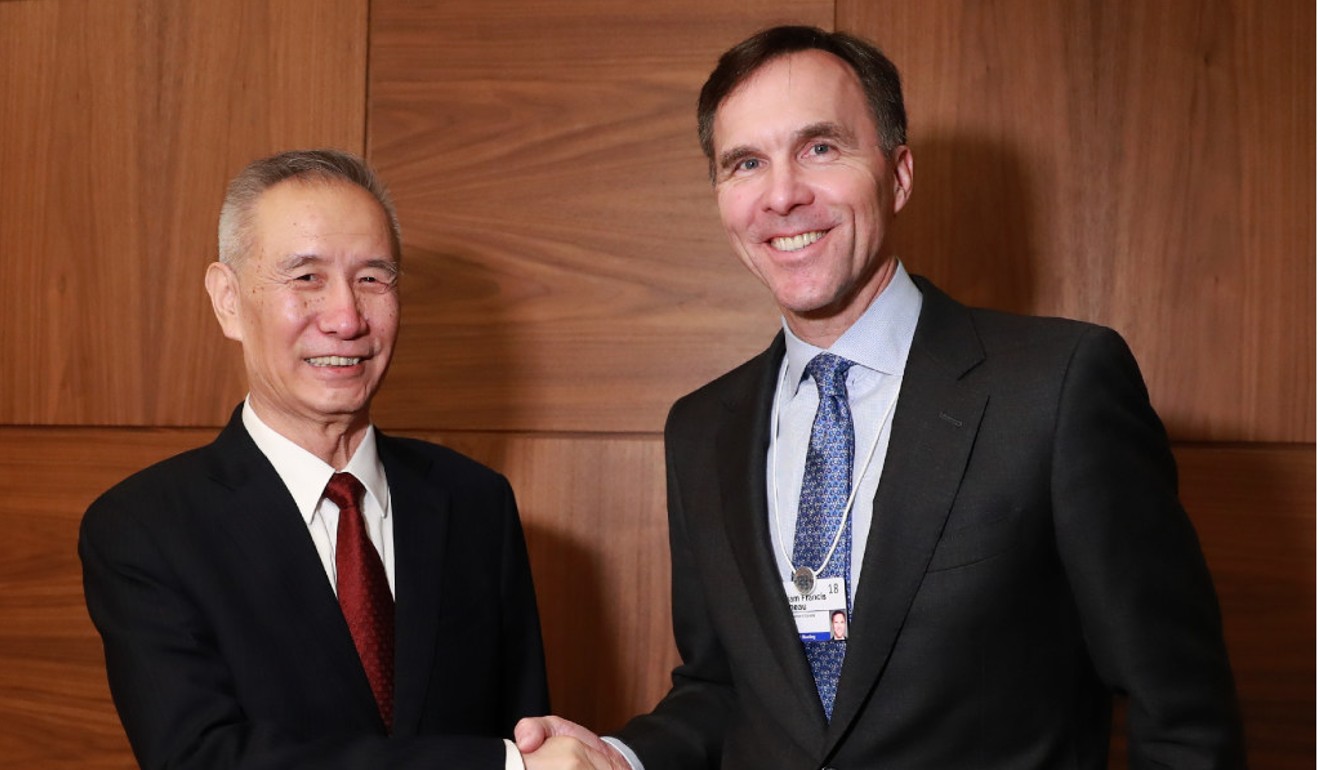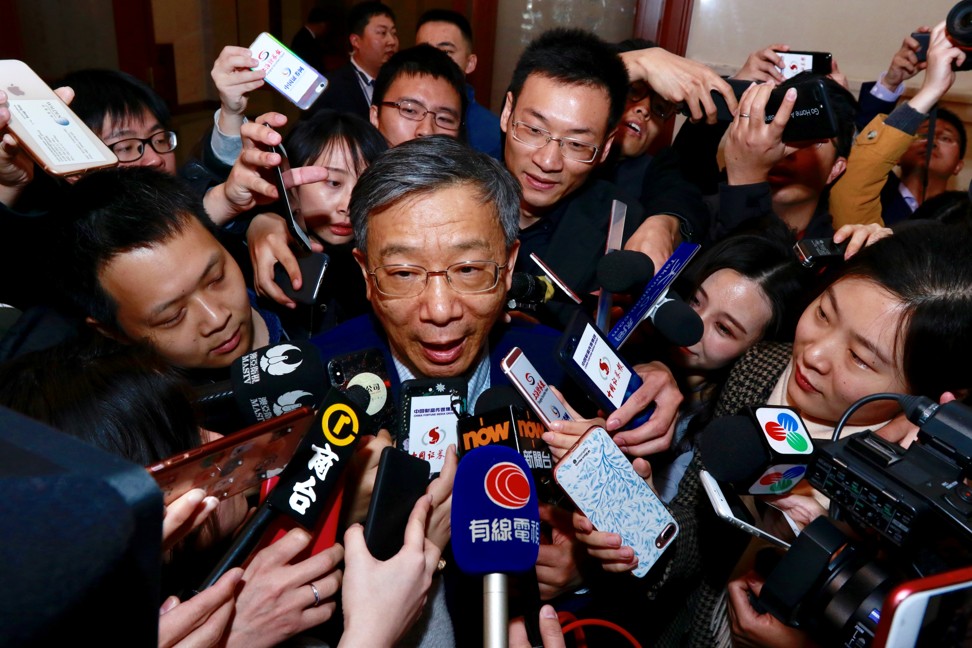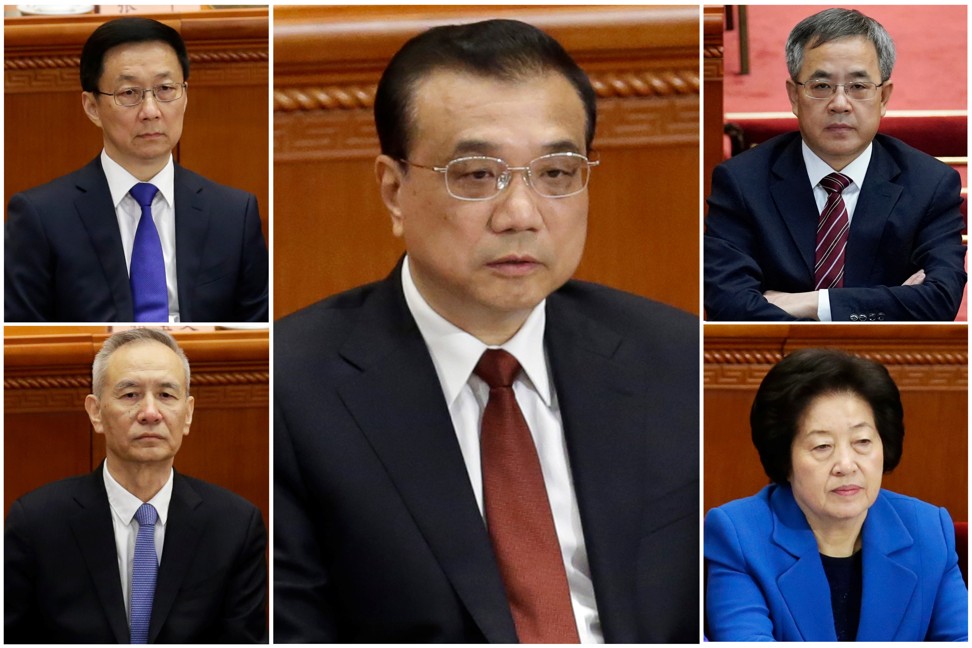
Vice-Premier Liu He set to lead China’s new economic team as government line-up finalised
Like new central bank chief Yi Gang, Liu’s overseas experience expected to stand him in good stead for challenges ahead
Harvard-educated economist Liu He is set to play a pivotal role in the management of China’s US$12 trillion economy – alongside newly appointed central bank governor Yi Gang – after being named on Monday as one the country’s four vice-premiers.
While the division of duties among the four deputies to Premier Li Keqiang has yet to be announced, 66-year-old Liu is the hot favourite to lead on economic and financial affairs, which would include the handling of trade issues with the United States.
Besides already being an economic adviser to President Xi Jinping, Liu is the only vice-premier to have had an overseas education – he was a visiting scholar at Seton Hall University in New Jersey in the US in the early 1990s and completed a master’s degree in international finance and trade at Harvard University’s John F Kennedy School of Government.
As China seeks to boost its profile on the world stage, officials with overseas experience are regarded as valuable assets, as was showed when Liu was sent to Washington recently to help ease trade tensions between the two economic giants.
The People’s Bank of China’s new chief Yi has a similar profile to Liu, and the two men are expected to work ever more closely together in the years ahead. They are already linked through the Leading Group for Financial and Economic Affairs, which is headed by Liu, with Yi as one of his assistants.

Professor Sun Wujun from the Nanjing University Business School, said there was little doubt Liu would be an influential figure on matters concerning China’s economic and financial future.
“[He] will definitely play a crucial role … He has moved to the frontline of decision-making from policy-drafting behind the curtains,” he said.
“His new title [of vice-premier] will give him greater authority [and] a bigger stage on which to display his understanding of the Chinese economy”, which is currently grappling with a huge debt problem, industrial overcapacity and a glut of property.
Deng Haiqing, an economist with Chinese brokerage house JZ Securities said in a note that the appointment of 60-year-old Li sent a strong message that China not only supported globalisation but also “aspired to have a big voice in global economic governance”.
It showed Beijing was trying to grab a “historical opportunity” to shape the global financial order as the US, under Donald Trump, adopted an anti-globalisation stance, Deng said.
The National People’s Congress also on Monday announced the appointment of Liu Kun as finance minister. The former head of the NPC’s budgeting department has never worked directly with Liu He, although the two men do have a tenuous link through He Lifeng, the head of the National Development and Reform Commission and another of Xi’s trusted allies.
Liu Kun and He studied together more than 30 years ago, while Liu He worker with He at the economic planning agency.
The final member of China’s economic team to be confirmed was Zhong Shan, the incumbent commerce minister.
With a mandate secured until 2023, the team will now work to achieve Xi’s goals for China to maintain “stable and healthy” growth, lower financial risks, improve its environment and eradicate absolute poverty.
While China achieved 6.9 per cent growth in 2017 and a per capita GDP close to US$10,000, questions remain about the sustainability of its economic model due to excessive liquidity following a decade of monetary easing, as well as other issues such as a yawning wealth gap and widespread pollution.
In an article written about the 2008 global financial crisis and the Great Depression of the 1920s, Liu He said that there were warning signs before a major crisis, including a long period of economic exuberance, the advancement of new technologies, lax government regulation, a widening income gap, monetary policy easing and a mania among the public to “get rich quick”.
While he was not referring specifically to China, analysts noted the similarities.
According to Liu Shengjun, a researcher at the China Financial Reform Institute in Shanghai, Liu and his team of economic and financial officials would face a “much tougher situation” than their predecessors had.
“Reform has stagnated over the past five years, debt has piled up and property bubbles are growing,” he said.
“With financial risks at a dangerous level, this new line-up of top officials will be under unprecedented pressure.”
While Liu He will lead the economic team, he in turn will report to Premier Li, while Han Zheng – a member of the Communist Party’s Politburo Standing Committee who was also confirmed as a vice-premier on Monday, will be the de facto executive vice-premier.
Hu Chunhua and Sun Chunlan were named as the other two vice-premiers, while Miao Wei retained his position as industry minister.
Chen Long, an economist at research firm Gavekal Dragonomics in Beijing, wrote in a note that the new government line-up was perfectly suited to the job the nation’s leader had in mind for it.
“Xi [Jinping] respects professionalism when it comes to the management of financial policy” and the team unveiled on Monday is “a nod to those officials who are able to project China’s economic interests to the wider world”, he said.




